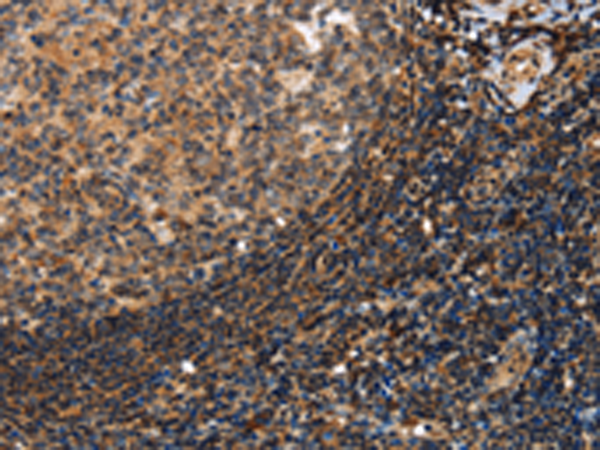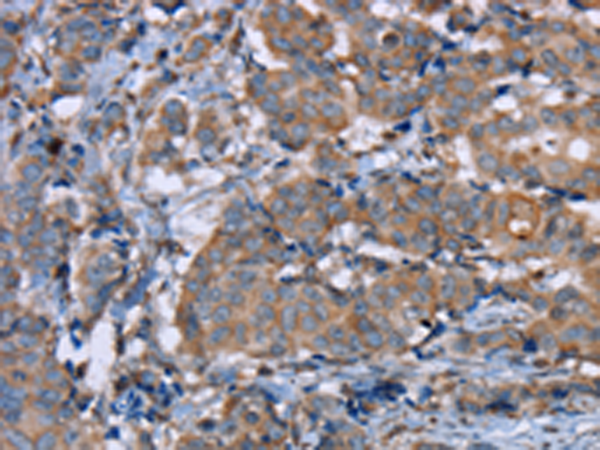


| WB | 咨询技术 | Human,Mouse,Rat |
| IF | 咨询技术 | Human,Mouse,Rat |
| IHC | 1/50-1/200 | Human,Mouse,Rat |
| ICC | 技术咨询 | Human,Mouse,Rat |
| FCM | 咨询技术 | Human,Mouse,Rat |
| Elisa | 1/2000-1/10000 | Human,Mouse,Rat |
| Aliases | ESA; PON; MVCD5 |
| WB Predicted band size | 40 kDa |
| Host/Isotype | Rabbit IgG |
| Antibody Type | Primary antibody |
| Storage | Store at 4°C short term. Aliquot and store at -20°C long term. Avoid freeze/thaw cycles. |
| Species Reactivity | Human, Mouse, Rat |
| Immunogen | Synthetic peptide of human PON1 |
| Formulation | Purified antibody in PBS with 0.05% sodium azide and 50% glycerol. |
+ +
以下是关于PON1抗体的3篇参考文献示例(注:以下内容为假设性示例,实际文献需通过学术数据库检索确认):
---
1. **文献名称**: *Development of a High-Specificity ELISA for Human Paraoxonase 1 (PON1) Using a Novel Monoclonal Antibody*
**作者**: Smith A, et al.
**摘要**: 本研究开发了一种基于新型单克隆抗体的人源PON1 ELISA检测方法,验证了其在血清样本中的高灵敏度和特异性,为心血管疾病风险标志物的定量分析提供了新工具。
2. **文献名称**: *PON1 Antibody Localization in Atherosclerotic Plaques: Implications for Oxidative Stress Modulation*
**作者**: Chen L, et al.
**摘要**: 通过免疫组化技术,研究发现PON1抗体可特异性标记动脉粥样硬化斑块中的PON1蛋白表达,提示其在抗氧化应激和炎症调控中的潜在作用。
3. **文献名称**: *Anti-PON1 Autoantibodies as a Biomarker in Neurodegenerative Diseases*
**作者**: García-Ruiz C, et al.
**摘要**: 该文献报道了帕金森病和阿尔茨海默病患者血清中存在抗PON1自身抗体,其水平与疾病严重程度相关,可能为神经退行性疾病的诊断提供新生物标志物。
---
如需获取真实文献,建议通过 **PubMed** 或 **Web of Science** 检索关键词“PON1 antibody”或“paraoxonase 1 immunoassay”。
Paraoxonase-1 (PON1) is a calcium-dependent enzyme primarily synthesized in the liver and associated with high-density lipoprotein (HDL). It plays a crucial role in hydrolyzing lipid peroxides and organophosphates, contributing to antioxidant and anti-inflammatory functions. PON1's ability to prevent low-density lipoprotein (LDL) oxidation links it to cardiovascular health, neurodegenerative diseases, and metabolic disorders. Genetic polymorphisms in PON1 influence its activity and are associated with disease susceptibility.
PON1 antibodies are essential tools for detecting and quantifying PON1 protein levels in research. They are widely used in techniques like ELISA, Western blotting, and immunohistochemistry to study PON1 expression patterns in tissues or biofluids. These antibodies help elucidate PON1's role in oxidative stress, lipid metabolism, and detoxification pathways. In clinical contexts, they aid in exploring PON1 as a potential biomarker for atherosclerosis, diabetes, or organophosphate exposure.
Both monoclonal and polyclonal PON1 antibodies are commercially available, with specificity validated against recombinant or native PON1. Selecting appropriate antibodies requires attention to epitope regions, cross-reactivity (e.g., with PON2/PON3 isoforms), and application compatibility. Recent studies also investigate PON1's therapeutic potential, driving demand for reliable antibodies in drug development and mechanistic studies.
×